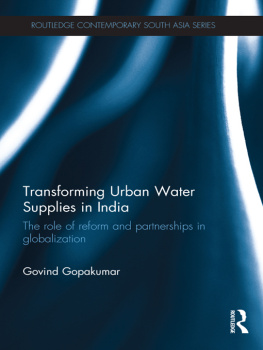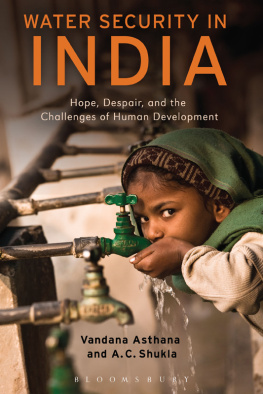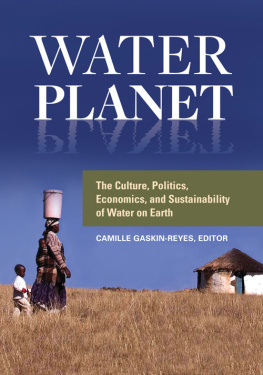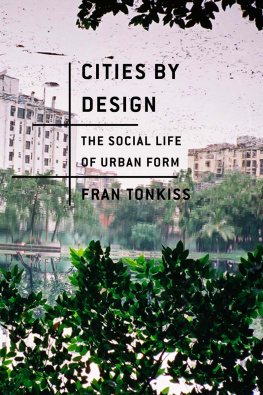Transforming Urban Water Supplies in India
The absence of water supply infrastructures is a critical issue that affects the sustainability of many cities in the developing world, and the quality of life of millions of people living in these cities. Urban India has probably the largest concentration of people in the world lacking safe access to these infrastructures.
This book is a unique study of the politics of water supply infrastructures in three metropolitan cities in contemporary India Bangalore, Chennai, and Kochi. It examines the process of change in water supply infrastructure, initiated by the notable effort of publicprivate partnerships to reveal the complexity of statesociety relations in India at the state, city, and neighborhood levels. Using a comparative methodology, the book develops an understanding of the changes in the production of reform water policy in contemporary India and its reception at the subnational (state) level. It goes on to examine the governance of water supply regimes in Bangalore, Chennai, and Kochi, and evaluates the role of the partnerships in reforming water supply. The book is a useful contribution to studies on urban development and South Asian politics.
Govind Gopakumar is Assistant Professor at the Centre for Engineering in Society (CES) at Concordia University, Canada. His research seeks to understand the social, policy, and technical dynamics of infrastructure with the focus on the policy dynamics of urban water supply.
Transforming Urban Water
Supplies in India
The role of reform and
partnerships in globalization
Govind Gopakumar
First published 2012
by Routledge
2 Park Square, Milton Park, Abingdon, Oxon OX14 4RN
Simultaneously published in the USA and Canada
by Routledge
711 Third Avenue, New York, NY 10017
Routledge is an imprint of the Taylor & Francis Group, an informa business
2012 Govind Gopakumar
The right of Govind Gopakumar to be identified as author of this work has been asserted by him in accordance with sections 77 and 78 of the Copyright, Designs and Patents Act 1988.
All rights reserved. No part of this book may be reprinted or reproduced or utilised in any form or by any electronic, mechanical, or other means, now known or hereafter invented, including photocopying and recording, or in any information storage or retrieval system, without permission in writing from the publishers.
Trademark notice: Product or corporate names may be trademarks or registered trademarks, and are used only for identification and explanation without intent to infringe.
British Library Cataloguing in Publication Data
A catalogue record for this book is available from the British Library
Library of Congress Cataloging in Publication Data
Gopakumar, Govind.
Transforming urban water supplies in India: the role of reform and partnerships in globalization/Govind Gopakumar.
p. cm. (Routledge contemporary South Asia series; 50)
Includes bibliographical references and index.
ISBN 978-0-415-67067-8 (hardback) ISBN 978-0-203-80399-8 (ebook) 1. Water resources developmentIndia. 2. Water-supplyGovernment policyIndia. I. Title.
HD1698.I5G67 2011
363.610954dc22
2011010549
ISBN: 978-0-415-67067-8 (hbk)
ISBN: 978-0-203-80399-8 (ebk)
To my parents, Jayasree and Gopakumar, for being with me
To my wife, Smitha, and son, Tejas, with thanks
Illustrations
| Figures |
| 2.1 |
| 3.1 |
| 3.2 |
| 4.1 |
| 4.2 |
| 4.3 |
| 4.4 |
| 4.5 |
| 4.6 |
| 4.7 |
| Tables |
| 2.1 |
| 5.1 |
| 6.1 |
Preface
This book arose from two of my long-standing interests: on one hand, cities and their infrastructures; and on the other, conflicts over access to water. Urban India presents, I think, one of the richest examples of the intertwining of infrastructures with issues around access to water. The sheer scope of encounters and negotiations around water supply in the urban Indian context are, in my opinion, truly astounding. There are many reasons for this complex system, but four stood out as particularly relevant: (1) the role of democratic process and governance in the Indian context; (2) the scale of social, cultural, and political heterogeneity; (3) Indias traditions of engineering practice and service provision; and (4) the enduring traditions of protest and engagement in a wide variety of social causes.
First, like many other things in the country, Indian democracy is difficult to characterize in simplistic, universally accepted terms. However, most Indians would agree that the practice of democracy is not a quiet, under-wraps affair conducted behind closed doors by a few elites. Indeed, few things in India generate as much conversation, debate, amusement, cynicism, and hysteria as the day-to-day conduct of the state and the people who manage it. But, strangely enough, there has been little empirical research, to my knowledge, on water and democracy in India (especially in urban India). It troubled me that no one had examined how a raucous democracy has infiltrated the countrys provision of water. My gut feeling was that, given the special way democracy was midwifed in India, there must be a unique story about its role in water supply a story which could not only inform our understanding of water provision, but also inform our understanding of democracy. Second, Indias tremendous diversity is reflected in socio-cultural dimensions such as language, religion, caste, and ethnicity. Although few countries can match Indias cultural breadth, two further factors contribute to the nations uniqueness: namely, the widespread assertion of heterogeneity in society and politics, and, more importantly, the territorial ordering of much of its diversity. Assertion of difference is a recent product of the opportunities that political democracy has provided for status advancement in an otherwise rigidly stratified society. A second more telling facet of Indias diversity is the close association between geographic territories and social difference. This territorial ordering gives each region a different socio-political vocabulary that is rooted in the particular histories and contexts of place. To my mind, this unique arrangement of diversity inflects the dynamics of water supply provision in India, and offers further reason for study of this subject.
A third reason is Indias post-independence traditions of engineering practice and service provision. As part of its pronounced interest in social and economic development since independence, India has worked to establish these traditions of engineering practice for public projects. Although certain larger ventures (such as dams and nuclear, space, and defense administration) have attracted the majority of the attention, even mundane activities such as water supply provision have been targets of technical administration. This is most evident in the countrys large metropolitan cities. A final reason that enriches the topic of water supply in urban India is the robust native traditions of protest and social mobilization. The roots of the nationalist movement have engendered a political climate conducive to citizen action. The sixty-odd years since independence (and the many mobilizational efforts in the interim) have provided Indians with a rich legacy of protest imageries, idioms, and vocabularies. This collective inheritance has shaped the kinds of responses that water access (or the lack thereof) has provoked in society.







